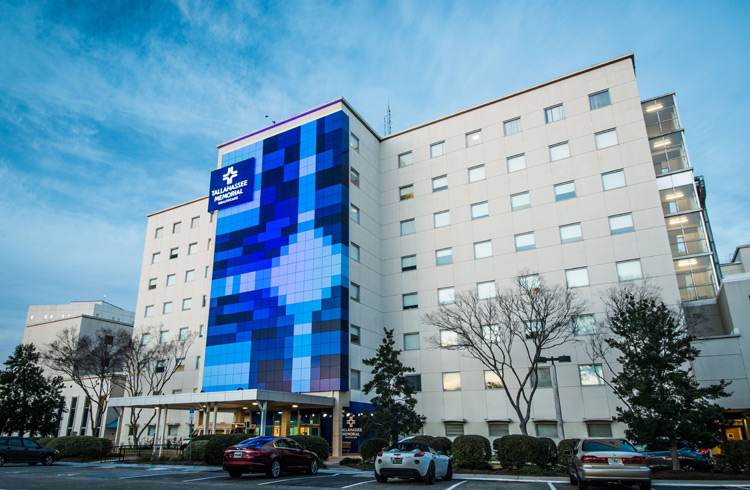What Is Trauma Care? Why Support Beyond the Emergency Room Is So Essential
September 18, 2025
By: Tallahassee Memorial HealthCare
Categories: Healthy Living, Trauma
Tallahassee Memorial HealthCare (TMH) is proud to be home to the region’s only Level II Trauma Center, home to four dedicated trauma surgeons who provide 24/7 coverage to patients in Tallahassee and the surrounding region.
While 24/7 surgical care is a key component of serving as a Level II Trauma Center, trauma care extends beyond the emergency interventions applied in the ER and operating room. Initial efforts stabilize patients, but ongoing support—such as psychological healing and rehabilitation—addresses the full spectrum of long-term recovery needs.
What Does the Trauma Care Journey Entail?
Trauma care covers a wide range of injury patterns, so each patient's journey can vary. Surprisingly, trauma care is mostly non-operative, meaning not every trauma alert patient requires surgery. Depending on the severity and injury pattern, some patients may go straight to surgery, while others are admitted to the surgical critical care unit or postoperative care units.
The length of stay depends on the nature of the injury—some patients with simple injuries may stay only a day, while those with multiple system injuries or complex social situations may remain in the hospital for months.
“We see a wide spectrum in terms of the length of the stay. However, on average, a trauma patient is generally in the hospital somewhere around three to five days,” says John Dortch, a fellowship-trained trauma surgeon and the medical director of TMH’s trauma program.
Understanding the Mental Aspect That Accompanies the Physical Trauma
Traumatic accidents can profoundly impact a person’s life, affecting work, family, and coping with loss. TMH’s Behavioral Health Center offers key support with services from psychiatrists and clinical psychologists.
In recent years, TMH has implemented screening programs to identify patients at risk for conditions like post-traumatic stress disorder (PTSD) and substance abuse, which can contribute to trauma recidivism. These screenings help ensure patients receive the appropriate care, whether through psychiatry or clinical psychology.
Dr. Dortch says the support that goes beyond the ER is critically important—highlighting how a holistic approach to trauma care is essential for helping patients heal physically, emotionally and mentally.
“For our team, it's crucial for us to understand that when we walk into the room with a trauma patient, we may very well be meeting that person on the worst day of their life,” notes Dr. Dortch. “There's no doubt about it, trauma can completely upend someone's life in many different ways.”
Importance of Spiritual Support
Behavioral and psychosocial support teams at TMH contribute throughout a trauma patient’s care. The chaplain service engages early, arriving in the trauma bay for all level one trauma alerts and supporting both patients and families during the hospital stay.
“Particularly with our spiritual care team, they receive the trauma alerts the same way we do. We're often in the trauma bay before the patient rolls in, and they're actually right there with us, prepared and ready to engage with the patients or their families,” explains Dr. Dortch.
The clinical psychology team, particularly for patients with brain and spinal cord injuries, gets involved later in the process—once the patient has emotionally processed what has happened and is preparing to transition out of the hospital. This coordination ensures patients are connected with necessary resources as they recover.
Education and Community Outreach: A Key Element of Trauma Care
Education and prevention are integral parts of trauma care at TMH. As part of the hospital’s state accreditation, there is a focus on both education and community outreach, addressing specific injury patterns seen at the hospital.
For example, the trauma team hosts events such as simulated drunk-driving accidents at local high schools to educate students on the dangers of substance abuse and driving. Additionally, TMH has been involved in the Rural Trauma Team Development Course (RTTDC) which aims to improve communication and processes between TMH and smaller, outlying community hospitals that refer patients to them.
“We try to identify ways we can help them be more efficient. Ways we can give a patient who presents to one of these rural hospitals a fighting chance, before they can be transferred to an area of definitive care,” says Dr. Dortch. “These outreach projects are really what we’ve focused on to date and that we hope to continue to do in the future.”
Two Focused Populations: Children and Seniors
At TMH, vulnerable populations such as children and senior patients may receive additional care and attention during traumatic events. Specialized care guidelines have been developed for both groups.
For senior patients, the focus is on managing polypharmacy and blood thinners through early screening. And, for pediatric patients, there is an emphasis on identifying and addressing social barriers at home that could make their recovery unsafe. Physical therapists and case managers work closely together to ensure older patients receive the appropriate medical equipment or rehabilitation, while ensuring safe discharge plans for all patients.
Trauma-Informed Care: Putting the Patient Front and Center
Trauma-informed care emphasizes understanding and addressing the preconceived notions healthcare providers may have when engaging with patients, specifically those who’ve experienced traumatic injury. Trauma surgeons must approach patients with humility, recognizing that they can never fully understand the patient’s experience unless they've gone through similar trauma themselves.
Creating a safe environment, especially for victims of violent crimes, is crucial. Trauma patients are often still processing their experience, and healthcare providers should give them a sense of empowerment and a voice in their care. Frustration or difficult behavior may be a patient's way of coping, and it’s important to recognize this as part of their emotional healing process.
“For me, trauma-informed care is really about having humility and an openness to helping a patient voice what they've experienced and empowering them to be able to process that, move through it and incorporate this traumatic event into their life view,” shares Dr. Dortch.
Learn more about trauma care at TMH by visiting TMH.ORG/Trauma.

